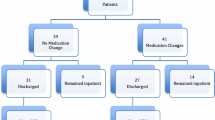Abstract
Aims
Little is known about the outcome of brief inpatient treatment interventions in routine psychiatric practice. The aim of this article was to study if subjective and assessed outcome of brief psychiatric inpatient care are related to patient characteristics, coercion at admission and during care, and other treatment characteristics.
Method
A total of 233 involuntarily and voluntarily admitted patients were interviewed within 5 days from admission and at discharge or after 3 weeks of care. Outcome was measured as reported by patients and by change in GAF (Global Assessment Scale) scores.
Results
Predictors for a positive subjective outcome were if the patients reported that they had been well treated by the staff and had contact persons at the ward. Predictors for a GAF improvement were a low GAF score at admission and a mood disorder diagnosis.
Conclusions
Subjectively reported outcome and outcome measured by assessing change in level of functioning differed. Coercion was not related to outcome. The way the patient perceived they had been treated by the staff was strongly related to subjective outcome.
Similar content being viewed by others
References
Pijl YJ, Kluiter H, Wiersma D (2000) Change in Dutch mental health care: an evaluation. Soc Psychiatry Psychiatr Epidemiol 35:402–407
Silfverhielm H, Kamis-Gould E (2000) The Swedish mental health system. Int J Law Psychiatry 21:293–307
Bülow P, Svensson T, Hansson JH (2002) Long-term consequences of the reformation of psychiatric care: a 15-year follow-up study. Nord J Psychiatry 56:15–21
Levinson D, Lerner Y, Lichtenberg P (2003) Reduction in inpatient length of stay and changes in mental health care in Israel over four decades: a national case register study. Isr J␣Psychiatry Relat Sci 40:240–247
Clarke P, Hafner RJ, Holme G (1997) The brief admission unit in emergency Psychiatry. J Clin Psychol 53:817–823
Svensson B, Hansson L (1994) Patient satisfaction with inpatient psychiatric care. The influence of personality traits, diagnosis and perceived coercion. Acta Psychiatr Scand 90:379–384
Nicholson RA, Ekenstam C, Norwood S (1996) Coercion and the outcome of psychiatric hospitalization. Int J Law Psychiatry 19:201–217
Kjellin L, Andersson K, Candefjord IL, et al. (1997) Ethical benefits and costs of coercion in short-term inpatient psychiatric care. Psychiatric Serv 48:1567–1570
Høyer G, Kjellin L, Engberg M, et al. (2002) Paternalism and autonomy: a presentation of a Nordic study on the use of coercion in the mental health care system. Int J Law Psychiatry 25:93–108
Gardner W, Hoge S, Bennet N, et al. (1993) Two scales for measuring patients’ perception for coercion during mental hospital admission. Behav Sci Law 11:307–321
American Psychiatric Association (1994) Diagnostic and statistical manual of mental disorders (DSM-IV), 4th edn. APA, Washington DC
Overall JE, Gorham DR (1962) The brief psychiatric rating scale. Psychol Rep 10:799–812
Candefjord IL, Lampinen K, Ängfors G (1994) Patienters upplevelse av akut psykiatrisk vård. (Patients’ experiences of short-term inpatient psychiatric care. In Swedish). Soc Med Tidskr 71:447–453
Kjellin L, Andersson K, Bartholdson E, et al. (2004) Coercion in psychiatric care - patients’ and relatives’ experiences from four Swedish psychiatric services. Nord J Psychiatry 58:153–159
Gilbody S, House AO, Sheldon TA (2002) Outcomes research in mental health. Br J Psychiatry 181:8–16
Rogers A (1993) Coercion and “voluntary” admission: an examination of psychiatric patient views. Behav Sci 11:259–267
Monahan J, Hoge SK, Lidz C, et al. (1995) Coercion and commitment. Understanding involuntary mental hospital admission. Int J Law Psychiatry 18:249–263
Kjellin L, Westrin CG (1998) Involuntary admissions and coercive measures in psychiatric care. Int J Law Psychiatry 21:31–42
Steinert T, Schmid P (2004) Effect of voluntariness of partipation in treatment on short-term outcome of inpatients with Schizophrenia. Psychiatric Serv 55:786–791
Acknowledgements
The authors wish to thank all members of the research teams in the participating centres. The study was supported by grants from the County Councils of Kristianstad, Älvsborg, Västmanland, Västerbotten, Örebro and the National Board of Health and Welfare.
Author information
Authors and Affiliations
Corresponding author
Rights and permissions
About this article
Cite this article
Wallsten, T., Kjellin, L. & Lindström, L. Short-term outcome of inpatient psychiatric care—impact of coercion and treatment characteristics. Soc Psychiat Epidemiol 41, 975–980 (2006). https://doi.org/10.1007/s00127-006-0131-6
Accepted:
Published:
Issue Date:
DOI: https://doi.org/10.1007/s00127-006-0131-6



